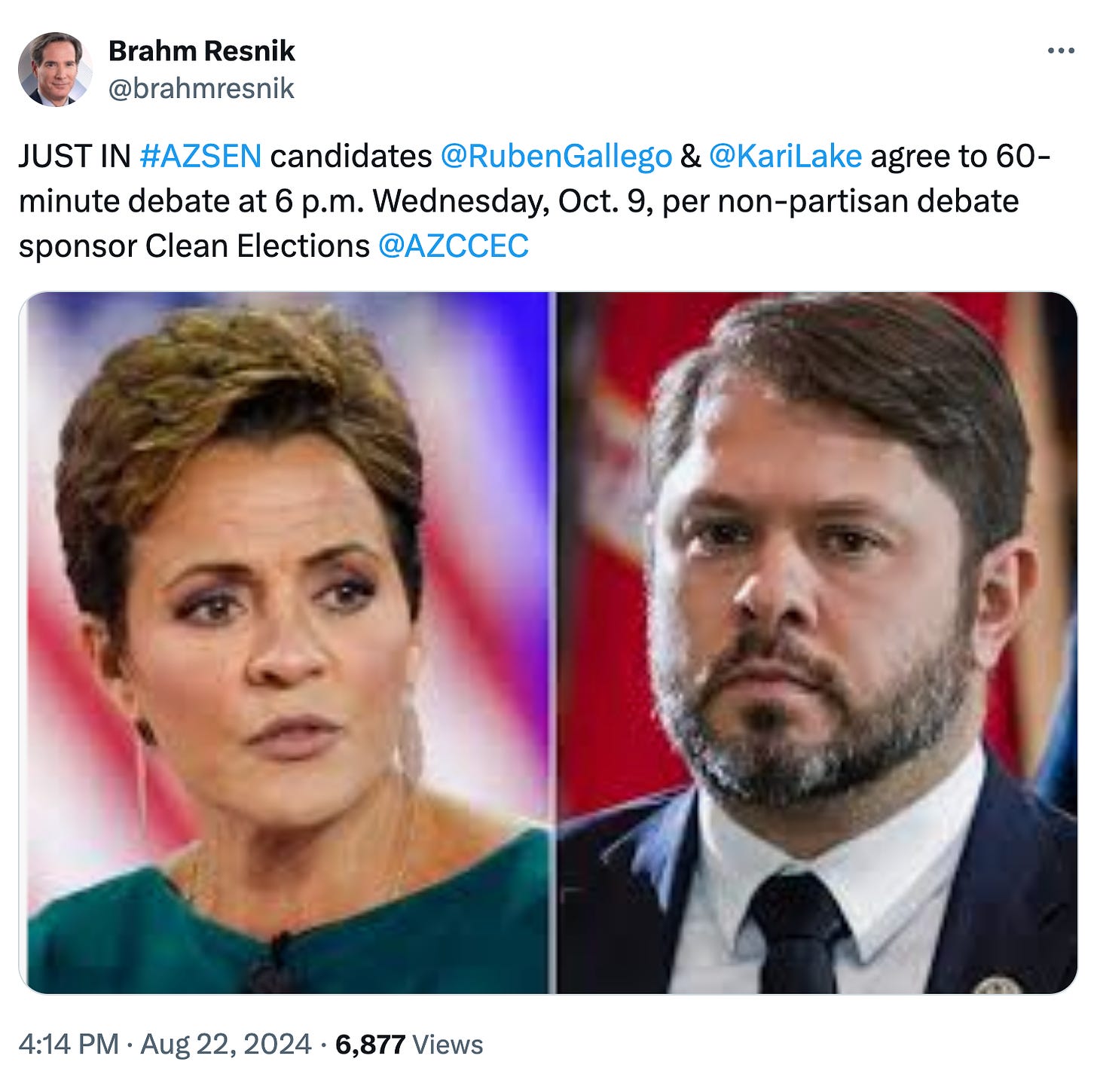The 13 questions on your ballot
Make sure your Sharpie has ink … Felon at the border … And there are still a few tickets left!
After weeks of lawsuits attempting to strike questions from Arizona’s long and loaded ballot, the final dominoes fell this week.
In a series of rulings leading up to this week’s deadline to start printing ballots, Arizona Supreme Court justices gave the green light to the abortion rights citizen initiative and the tipped workers ballot measure.
They also said the fair elections initiative wasn’t unconstitutional and shot down a lawsuit over the signatures gathered to get it on the ballot.
That pretty much brings to a close the seemingly endless arguments over whether a measure was too broad to satisfy the single-subject rule or whether the title of a measure would mislead voters, as well as haggling over signatures.
These arguments are part of the regular election, but this year had an added twist. GOP lawmakers spent the year trying to avoid Democratic Gov. Katie Hobbs veto stamp by sending 11 issues directly to voters, so the ballot is going to be longer than usual. The lawmaker-written measures account for all but two of the 13 measures that will be on the ballot. (Not including any local measures.)
Thankfully, lawsuit season should be over soon. Any issues with propositions are supposed to be resolved this week (although there is some wiggle room).
No more reading tortuous phrases five times to understand what just happened in any given lawsuit, like parsing through a judge issuing a stay in response to a lawsuit to block a challenge to a ballot measure, pending appeal by a full panel.
Soon we’ll be getting into the passionate arguments about abortion or the border during the final stretch before the general election in November.
The Big Two
Two of the highest-profile ballot measures survived multiple legal challenges to appear on the ballot.
Prop 139: Abortion is a right
The Arizona Supreme Court said the Arizona for Abortion Access Act, the citizen initiative that would make abortion a right, can go on the ballot.
Prop 314: Talking tough about the border
The other big measure also survived legal challenges. The Border Security Act was drafted by GOP lawmakers and would allow local police to arrest people for crossing the border illegally.
Dueling propositions
Lawmakers sent several legislative referrals to the ballot this year that were designed to counteract proposed citizen initiatives, or laws proposed by the voters.
Prop 140 and 133: The battle over primary elections
The justices on Thursday also gave the green light to the “open primary” citizen initiative (Prop 140), which would eliminate partisan primaries and require every candidate to run against every other candidate in a primary. Backers of the proposition say they’re hoping to make it harder for extreme candidates to get into office simply by winning a primary where only the most hardcore voters tend to show up.
But voters also will weigh in on an opposing measure (Prop 133) that would essentially ban what Prop 140 is trying to do. This one was written by GOP lawmakers as the popularity of “ranked choice voting” started to catch on.
Tip your server
Voters almost had another pair of dueling propositions. The One Fair Wage Act, which would have raised the minimum wage to $18 an hour and boost the pay of tipped workers, didn’t make it on the ballot after opponents challenged the signatures gathered by Raise the Wage AZ in support of the measure.
But on Thursday, the Arizona Supreme Court gave the green light to a competing measure written by GOP lawmakers (with a handful of Dem supporters), the Tipped Workers Protection Act (which will actually slightly lower those workers’ wages), after opponents said the name was deceptive.
Power to the people (at the Capitol)
Several measures would shift power to the Legislature, or at least move it out of the hands of the general public.
Prop 134: An Electoral College for Signatures
Backers of a citizen initiative would have to spread out to every part of the state, instead of focusing on the big cities. But it also would mean voters in a tiny district would have outsized power and could block the initiative for the entire state.
Prop 135: Lawmakers decide what’s an emergency
The governor would need legislators’ approval to extend a state of emergency (fire and floods not included). Lawmakers already limited the length of health emergencies during the coronavirus pandemic. Opponents say it would be a problem for the long-term response to an emergency. And what happens when the Legislature is not in session?
Prop 136: Only we get to make laws
Lawmakers would have the chance to preemptively stop citizen initiatives from getting on the ballot. They could ask a court to rule on the constitutionality of the initiative beforehand, rather than after voters approve it, which is the case now. If this were the law right now, lawmakers could have sued to stop the abortion rights measure from getting on the ballot.
Prop 137: Voters can’t remove judges
A commission would make those decisions for the Arizona Supreme Court, appellate court judges, and judges in Coconino, Maricopa, Pima and Pinal counties. Most notably, if the proposition is approved, voters would have no say about whether two Arizona Supreme Court justices who voted to restore the 1864 abortion ban, and are up for re-election this year, would keep their jobs.
Under the radar
These ones haven’t gotten nearly as much attention, but two of them could have far-reaching consequences. All of them were written lawmakers.
Prop 311: Backing the Blue
The state would pay $250,000 to the spouse or children of a first responder who died in the line of duty.
Prop 312: Fix homelessness, or we keep our money
Property owners would get a refund of their property taxes if officials don’t enforce certain public nuisance laws. Homelessness has been around as long as civilization.
Prop 313: Child sex trafficking
Impose life sentences for child sex trafficking. This one was inspired by the “Sound of Freedom” movie, the Arizona Mirror’s Jerod MacDonald Evoy reported. Democrats argued the law could penalize the victims of sex trafficking who often get used by their abusers to attract more victims.
Prop 315: Too much regulation
Put in place more oversight of any regulation proposed by a state agency that costs more than $500,000 over five years.
If political arguments are your thing, you’ll get your fill in a few weeks when the Arizona Secretary of State sends out publicity pamphlets with the arguments submitted by voters, organizations, and whoever was interested.
If you start missing lawsuit season, don’t worry. There are sure to be plenty of lawsuits filed against any of the measures voters approve in November.
Chaos and danger at the border: Former President Donald Trump held a rally down at the border yesterday where he accused Vice President Kamala Harris and other Democrats of “unleash[ing] a deadly plague of migrant crime,” per the New York Times. A great deal of what Trump said about the border was false, per an AZFamily fact check. Meanwhile, Cochise County sheriffs arrested a man who had lobbed online threats against the former president who recently survived an assassination attempt, CNN reports. He’s hosting a rally in Glendale today, but Republic columnist Greg Moore won’t be there — because the people who attend Trump rallies just are too weird, he writes, ticking off a list of examples.
“... Or the white woman selling Trump T-shirts and Confederate flags from the back of her truck at a Phoenix rally in 2020. I was sitting in my car across from her tent, talking on the phone to a source, when she came over to my window, knocking violently, demanding to know what I was doing there and threatening to call the police,” the Black columnist wrote.
Musketeers or stooges?: The Arizona Democratic delegation kicked journalists out of a not-that-interesting speechifying breakfast at the Democratic National Convention that is traditionally open to the press, Cronkite News’ Mia Osmonbekov reports. Meanwhile, three Arizonans headlined the final night of the DNC: Former Congresswoman Gabrielle Giffords and her husband, U.S. Sen. Mark Kelly, and U.S. Rep. Ruben Gallego.
“Nothing high level or secretive went on. I don’t see any reason why the press wasn’t (there),” Arizona delegate Ellen Ferreira told Osmonbekov.
Win some, lose some: The United States Supreme Court partially upheld an Arizona law attempting to kick thousands of “federal only” voters off of Arizona’s voter roles, deciding that new voters must fill out the proof of citizenship portion of the Arizona voter registration form. But the court rejected arguments from Republicans that the tens of thousands of registered voters who simply swore they were citizens without providing proof (as is required in most states and on the federal form) should not be allowed to vote this year, the Republic’s Sasha Hupka writes.
Surprise arrest: The Surprise City Council had an activist arrested after she showed up at her City Council to complain about how much the city attorney is paid, the Republic’s Shawn Raymundo reports. She’s accused of breaking a rule stating residents can’t use the meetings to “lodge charges or complaints against any employee of the City or members of the body,” which really goes against that whole Right to Redress Grievances part of the U.S. Constitution. Police cited Rebekah Massie for trespassing and resisting arrest, though she says she may sue the city for violating her First Amendment rights.
If you complain to us, we won’t arrest you!
Fentanyl would like a word: Superintendent of Public Instruction Tom Horne says cell phone addiction has “become the heroin of our time” at a press conference announcing his plans to support legislation next year that’s similar to a bill Gov. Katie Hobbs vetoed this year. Horne urged people to call the Governor’s Office to tell her not to veto it next time, though his office didn’t sign in to support that Republican-sponsored bill to limit cell phones in class this year.
Flat mathers unite: The Chandler Unified School District is asking parents to approve totally normal curriculum — like basic math — for fear of being prosecuted under a 2011 law that gives parents the right to request an alternate assignment if parents believe the material is “harmful,” the Phoenix New Times’ Morgan Fischer reports.
Former President Donald Trump, who is notably nervous about the size of his … rallies, is hosting a rally in Glendale today at the same venue that Kamala Harris packed last week.
The crowd comparison will be a major focus for the media. And Trump is clearly concerned.
Yesterday, Trump reached out to offer us “FREE TICKETS.” Though they were only available on a first come first serve basis, we were able to snag two tickets late yesterday.










One other charming detail about Prop 140 (a detail about details, really): it leaves many important details to the legislature, like which primary candidates go on to the general election. What could possibly go wrong?
Help me out, what is wrong with asking someone to definitively prove that they are a citizen before they exercise a citizen’s right to vote?